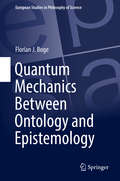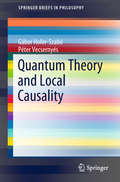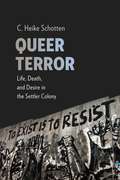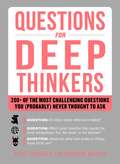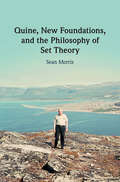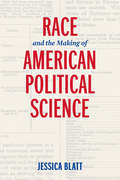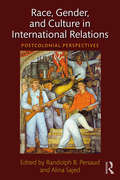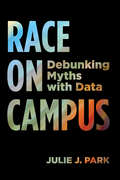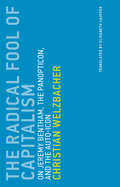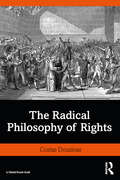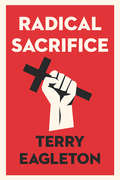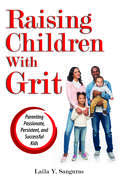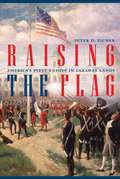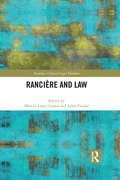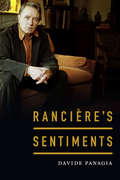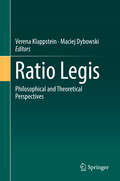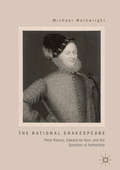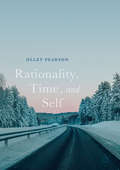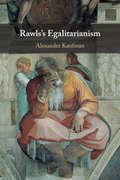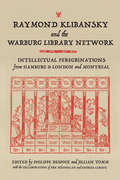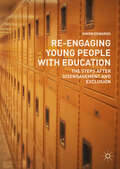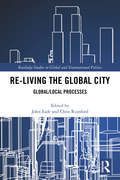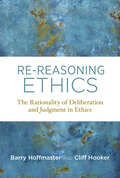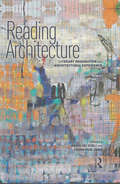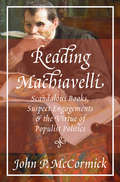- Table View
- List View
Quantum Mechanics Between Ontology and Epistemology (European Studies in Philosophy of Science #10)
by Florian J. BogeThis book explores the prospects of rivaling ontological and epistemic interpretations of quantum mechanics (QM). It concludes with a suggestion for how to interpret QM from an epistemological point of view and with a Kantian touch. It thus refines, extends, and combines existing approaches in a similar direction. The author first looks at current, hotly debated ontological interpretations. These include hidden variables-approaches, Bohmian mechanics, collapse interpretations, and the many worlds interpretation. He demonstrates why none of these ontological interpretations can claim to be the clear winner amongst its rivals. Next, coverage explores the possibility of interpreting QM in terms of knowledge but without the assumption of hidden variables. It examines QBism as well as Healey’s pragmatist view. The author finds both interpretations or programs appealing, but still wanting in certain respects. As a result, he then goes on to advance a genuine proposal as to how to interpret QM from the perspective of an internal realism in the sense of Putnam and Kant. The book also includes two philosophical interludes. One details the notions of probability and realism. The other highlights the connections between the notions of locality, causality, and reality in the context of violations of Bell-type inequalities.
Quantum Theory and Local Causality (SpringerBriefs in Philosophy)
by Péter Vecsernyés Gábor Hofer-SzabóThis book summarizes the results of research the authors have pursued in the past years on the problem of implementing Bell's notion of local causality in local physical theories and relating it to other important concepts and principles in the foundations of physics such as the Common Cause Principle, Bell's inequalities, the EPR (Einstein-Podolsky-Rosen) scenario, and various other locality and causality concepts. The book is intended for philosophers of science with an interest in the formal background of sciences, philosophers of physics and physicists working in foundation of physics.
Queer Terror: Life, Death, and Desire in the Settler Colony (New Directions in Critical Theory #59)
by C. Heike SchottenAfter Sept. 11, 2001, George W. Bush declared, “Either you are with us, or you are with the terrorists.” Bush’s assertion was not simply jingoist bravado—it encapsulates the civilizationalist moralism that has motivated and defined the United States since its beginning, linking the War on Terror to the nation’s settlement and founding.In Queer Terror, C. Heike Schotten offers a critique of U.S. settler-colonial empire that draws on political, queer, and critical indigenous theory to situate Bush’s either/or moralism and reframe the concept of terrorism. The categories of the War on Terror exemplify the moralizing politics that insulate U.S. empire from critique, render its victims deserving of its abuses, and delegitimize resistance to it as unthinkable and perverse. Schotten provides an anatomy of this moralism, arguing for a new interpretation of biopolitics that is focused on sovereignty and desire rather than racism and biology. This rethinking of biopolitics puts critical political theory of empire in dialogue with the insights of both native studies and queer theory. Building on queer theory’s refusal of sanctity, propriety, and moralisms of all sorts, Schotten ultimately contends that the answer to Bush’s ultimatum is clear: dissidents must reject the false choice he presents and stand decisively against “us,” rejecting its moralism and the sanctity of its “life,” in order to further a truly emancipatory, decolonizing queer politics.
Questions for Deep Thinkers: 200+ of the Most Challenging Questions You (Probably) Never Thought to Ask
by Henry Kraemer Brandon MarcusBlending philosophy and humor, here are 250 thought-provoking, challenging, and strange questions—from the profound “what is the meaning of life?” to the playful “is a hotdog a sandwich?” and everything in between.Life is complex, confusing, and weird. But have you ever stopped to think about just how weird the world around you can be? For example: Which invention has caused the most unhappiness: fire, the wheel, or the internet? If a werewolf landed on the moon, would it touch down as a man or a wolf? When sitting at a movie theater, which armrest is yours? What’s the most untrustworthy animal? Would you rather kiss a person with jellybeans for teeth or a banana for a tongue? In Questions for Deep Thinkers, you’ll find 250 thought-provoking, challenging, and sometimes completely ridiculous questions that you (probably) never thought to even ask. Perfect for large group parties, hanging out with friends, or if you just want a moment to ponder some of life’s absurdities, this collection of head-scratching “deep questions” will leave you either in an argument or saying, “hmm, I never thought of that…” Don’t let the world’s most pressing mysteries pass you by!
Quine, New Foundations, and the Philosophy of Set Theory
by Sean MorrisQuine's set theory, New Foundations, has often been treated as an anomaly in the history and philosophy of set theory. In this book, Sean Morris shows that it is in fact well-motivated, emerging in a natural way from the early development of set theory. Morris introduces and explores the notion of set theory as explication: the view that there is no single correct axiomatization of set theory, but rather that the various axiomatizations all serve to explicate the notion of set and are judged largely according to pragmatic criteria. Morris also brings out the important interplay between New Foundations, Quine's philosophy of set theory, and his philosophy more generally. We see that his early technical work in logic foreshadows his later famed naturalism, with his philosophy of set theory playing a crucial role in his primary philosophical project of clarifying our conceptual scheme and specifically its logical and mathematical components.
Race and the Making of American Political Science (American Governance: Politics, Policy, and Public Law)
by Jessica BlattRace and the Making of American Political Science shows that changing scientific ideas about racial difference were central to the academic study of politics as it emerged in the United States. From the late nineteenth century through the 1930s, scholars of politics defined and continually reoriented their field in response to the political imperatives of the racial order at home and abroad as well to as the vagaries of race science.The Gilded Age scholars who founded the first university departments and journals located sovereignty and legitimacy in a "Teutonic germ" of liberty planted in the new world by Anglo-Saxon settlers and almost extinguished in the conflict over slavery. Within a generation, "Teutonism" would come to seem like philosophical speculation, but well into the twentieth century, major political scientists understood racial difference to be a fundamental shaper of political life. They wove popular and scientific ideas about race into their accounts of political belonging, of progress and change, of proper hierarchy, and of democracy and its warrants. And they attended closely to new developments in race science, viewing them as central to their own core questions. In doing so, they constructed models of human difference and political life that still exert a powerful hold on our political imagination today, in and outside of the academy.By tracing this history, Jessica Blatt effects a bold reinterpretation of the origins of U.S. political science, one that embeds that history in larger processes of the coproduction of racial ideas, racial oppression, and political knowledge.
Race, Gender, and Culture in International Relations: Postcolonial Perspectives
by Randolph Persaud Alina SajedInternational relations theory has broadened out considerably since the end of the Cold War. Topics and issues once deemed irrelevant to the discipline have been systematically drawn into the debate and great strides have been made in the areas of culture/identity, race, and gender in the discipline. However, despite these major developments over the last two decades, currently there are no comprehensive textbooks that deal with race, gender, and culture in IR from a postcolonial perspective. This textbook fills this important gap. Persaud and Sajed have drawn together an outstanding lineup of scholars, with each chapter illustrating the ways these specific lenses (race, gender, culture) condition or alter our assumptions about world politics. This book: covers a wide range of topics including war, global inequality, postcolonialism, nation/nationalism, indigeneity, sexuality, celebrity humanitarianism, and religion; follows a clear structure, with each chapter situating the topic within IR, reviewing the main approaches and debates surrounding the topic and illustrating the subject matter through case studies; features pedagogical tools and resources in every chapter - boxes to highlight major points; illustrative narratives; and a list of suggested readings. Drawing together prominent scholars in critical International Relations, this work shows why and how race, gender and culture matter and will be essential reading for all students of global politics and International Relations theory.
Race on Campus: Debunking Myths with Data
by Julie J. Park2020 Critics' Choice Book Award, American Educational Studies Association (AESA) In Race on Campus, Julie J. Park argues that there are surprisingly pervasive and stubborn myths about diversity on college and university campuses, and that these myths obscure the notable significance and admirable effects that diversity has had on campus life. Based on her analysis of extensive research and data about contemporary students and campuses, Park counters these myths and explores their problematic origins. Among the major myths that she addresses are charges of pervasive self-segregation, arguments that affirmative action in college admissions has run its course and become counterproductive, related arguments that Asian Americans are poorly served by affirmative action policies, and suggestions that programs and policies meant to promote diversity have failed to address class-based disadvantages. In the course of responding to these myths, Park presents a far more positive and nuanced portrait of diversity and its place on American college campuses. At a time when diversity has become a central theme and goal of colleges and universities throughout the United States, Race on Campus offers a contemporary, research-based exploration of racial dynamics on today&’s college campuses.
The Radical Fool of Capitalism: On Jeremy Bentham, the Panopticon, and the Auto-Icon (Untimely Meditations #10)
by Christian WelzbacherA fresh interpretation of Jeremy Bentham, finding that his “radical foolery” embodied a social ethics that was revolutionary for its time. Jeremy Bentham (1748–1832) is best remembered today as the founder of utilitarianism (a philosophy infamously abused by the Victorians) and the conceiver of the Panopticon, the circular prison house in which all prisoners could be seen by an unseen observer—later seized upon by Michel Foucault as the apotheosis of the neoliberal control society. In this volume in the Untimely Meditation series, Christian Welzbacher offers a new interpretation of Bentham, arguing that his “radical foolery” (paraphrasing Goethe's characterization of Bentham) actually embodied a social ethics that was new for its time and demands proper historical contextualization rather than retroactive analysis from the vantage point of late capitalism. Welzbacher provides just such an analysis, offering an account of the two great utilitarian projects that occupied Bentham all his life: the Panopticon and the Auto-Icon. Welzbacher rescues the Panopticon from the misapprehensions of Foucault, Orwell, and Lacan, arguing that Bentham saw the Panopticon as a pedagogical instrument incorporating the tenets of reason; construction and function, plan and influence, architecture and politics are brought into alignment. Bentham extolled the discovery in words that could easily be ascribed to Le Corbusier, Bruno Taut, or any other modernist architect. The Auto-Icon expressed Bentham's theories that the dead should benefit later generations; these theories were effectively sealed when Bentham decided to have his body preserved and put on display. (It can be seen today in a cabinet at University College London.) He also donated his inner organs to science—a practice outlawed at the time—and posthumously stage-managed his own ceremonial autopsy.Welzbacher reveals a Bentham who raised questions that feel familiar and current, invoking topoi that would come to define the modern era and that reverberate to this day.
The Radical Philosophy of Rights
by Costas DouzinasAfter 1989 human rights have expanded into a vernacular touching every aspect of social life. They are seen as the key concept in morals and politics and a main tool for forging individual and collective identities. They are the ideology after ‘the end of ideologies’ – the only values left after ‘the end of history’. The response of the left to the rights revolution has been muted and unsure. Classical Marxist critiques of (natural) rights have made the left justly suspicious, and this is still the case today. Elaborating and addressing a series of foundational paradoxes of rights, this book – the third in Costas Douzinas’s human rights trilogy, following The End of Human Rights and Human Rights and Empire – provides a long-overdue re-evaluation of the history and political uses of rights for the left. The book examines the history and philosophy of the (legal) person, the subject, the human and dignity from classical Rome to postmodern Brussels. It traces the gradual abandonment of right, virtue and the common good for individual rights and self-interest. The limited and distorted conception of rights of liberal jurisprudence is contrasted with an alternative that sees rights as a relation involved in the struggle for recognition and an everyday utopia. The right to resistance and revolution, prohibited but regularly returning like the repressed, rescues law from sclerosis and presents a case study of the paradoxical nature of rights. Finally, the book offers a brief examination of law’s encounter with radical politics informed by the author’s strange experience as an ‘accidental’ politician in the first radical left government in Europe. The book’s radical concept of legal philosophy and public law will be of considerable value to legal theorists, political philosophers and anyone with an interest in thinking and acting in ways that go beyond the limits of liberal, and neoliberal, ideology.
Radical Sacrifice
by Terry EagletonA trenchant analysis of sacrifice as the foundation of the modern, as well as the ancient, social order The modern conception of sacrifice is at once cast as a victory of self-discipline over desire and condescended to as destructive and archaic abnegation. But even in the Old Testament, the dual natures of sacrifice, embodying both ritual slaughter and moral rectitude, were at odds. In this analysis, Terry Eagleton makes a compelling argument that the idea of sacrifice has long been misunderstood. Pursuing the complex lineage of sacrifice in a lyrical discourse, Eagleton focuses on the Old and New Testaments, offering a virtuosic analysis of the crucifixion, while drawing together a host of philosophers, theologians, and texts—from Hegel, Nietzsche, and Derrida to the Aeneid and The Wings of the Dove. Brilliant meditations on death and eros, Shakespeare and St. Paul, irony and hybridity explore the meaning of sacrifice in modernity, casting off misperceptions of barbarity to reconnect the radical idea to politics and revolution.
Raising Children With Grit: Parenting Passionate, Persistent, and Successful Kids
by Laila SangurasGrit, the combination of passion and perseverance, has more of an influence on success than cognitive ability, and parents want nothing more than to raise happy, successful children. Raising Children With Grit: Parenting Passionate, Persistent, and Successful Kids provides the strategies that parents need to teach, motivate, and inspire children to pursue their passions with grit—and succeed. By focusing on self-discipline, parenting strategies, and personality traits, parents can cultivate perseverance in their children. By coupling that with an emphasis on curiosity and interest-building activities, parents can help their children define their passions. Additionally, this book offers tips for parents about working with school personnel, how to model grit in their own lives, and how social factors can influence the development of grit.
Raising the Flag: America's First Envoys in Faraway Lands
by Peter EicherSince its inception the United States has sent envoys to advance American interests abroad, both across oceans and to areas that later became part of the country. Little has been known about these first envoys until now. From China to Chile, Tripoli to Tahiti, Mexico to Muscat, Peter D. Eicher chronicles the experience of the first American envoys in foreign lands. Their stories, often stranger than fiction, are replete with intrigues, revolutions, riots, war, shipwrecks, swashbucklers, desperadoes, and bootleggers. The circumstances the diplomats faced were precursors to today’s headlines: Americans at war in the Middle East, intervention in Latin America, pirates off Africa, trade deficits with China. Early envoys abroad faced hostile governments, physical privations, disease, isolation, and the daunting challenge of explaining American democracy to foreign rulers. Many suffered threats from tyrannical despots, some were held as slaves or hostages, and others led foreign armies into battle. Some were heroes, some were scoundrels, and many perished far from home. From the American Revolution to the Civil War, Eicher profiles the characters who influenced the formative period of American diplomacy and the first steps the United States took as a world power. Their experiences combine to chart key trends in the development of early U.S. foreign policy that continue to affect us today. Raising the Flag illuminates how American ideas, values, and power helped shape the modern world.
Ranciere and Law (Nomikoi: Critical Legal Thinkers)
by Monica Lopez Lerma Julen EtxabeThis book is the first to approach Jacques Rancière’s work from a legal perspective. A former student of Louis Althusser, Rancière is one of the most important contemporary French philosophers of recent decades: offering an original and path-breaking way to think politics, democracy and aesthetics. Rancière’s work has received wide and increasing critical attention, but no study exists so far that reflects on the wider implications of Rancière for law and for socio-legal studies. Although Rancière does not pay much specific attention to law—and there is a strong temptation to identify law with what he terms the "police order"—much of Rancière’s historical work highlights the creative potential of law and legal language, with important legal implications and ramifications. So, rather than excavate the Rancièrean corpus for isolated statements about the law, this volume reverses such a method and asks: what would a Rancière-inspired legal theory look like? Bringing together specialists and scholars in different areas of law, critical theory and philosophy, this rethinking of law and socio-legal studies through Rancière provides an original and important engagement with a range of contemporary legal topics, including constituent power and democracy, legal subjectivity, human rights, practices of adjudication, refugees, the nomos of modernity, and the sensory configurations of law. It will, then, be of considerable interest to those working in these areas.
Rancière's Sentiments
by Davide PanagiaIn Rancière’s Sentiments Davide Panagia explores Jacques Rancière’s aesthetics of politics as it informs his radical democratic theory of participation. Attending to diverse practices of everyday living and doing—of form, style, and scenography—in Rancière’s writings, Panagia characterizes Rancière as a sentimental thinker for whom the aesthetic is indistinguishable from the political. Rather than providing prescriptions for political judgment and action, Rancière focuses on how sensibilities and perceptions constitute dynamic relations between persons and the worlds they create. Panagia traces this approach by examining Rancière’s modernist sensibilities, his theory of radical mediation, the influence of Gustave Flaubert on Rancière’s literary voice, and how Rancière juxtaposes seemingly incompatible objects and phenomena to create moments of sensorial disorientation. The power of Rancière’s work, Panagia demonstrates, lies in its ability to leave readers with a disjunctive sensibility of the world and what political thinking is and can be.
Ratio Legis: Philosophical And Theoretical Perspectives
by Verena Klappstein Maciej DybowskiThe book is dedicated to the theoretical problems concerning ratio legis. In the contexts of legal interpretation and legal reasoning, the two most important intellectual tools employed by lawyers, ratio legis would seem to offer an extremely powerful argument. Declaring the ratio legis of a statute can lead to a u-turn argumentation throughout the lifespan of the statute itself – in parliament, or in practice during court sessions, when it is tested against the constitution.Though the ratio legis argument is widely used, much about it warrants further investigation. On the general philosophical map there are many overlapping areas that concern different approaches to human rationality and to the problems of practical reasoning. Particular problems with ratio legis arise in connection with different perspectives on legal philosophy and theory, especially in terms of the methods that lawyers use for legal interpretation and argumentation. These problems can be further subdivided into particular aspects of activities undertaken by lawyers and officials who use the ratio legis in their work, and the underlying theories. In short, this book examines what ratio legis is, what it could be, and its practical implications.
The Rational Shakespeare: Peter Ramus, Edward de Vere, and the Question of Authorship
by Michael WainwrightThe Rational Shakespeare: Peter Ramus, Edward de Vere, and the Question of Authorship examines William Shakespeare’s rationality from a Ramist perspective, linking that examination to the leading intellectuals of late humanism, and extending those links to the life of Edward de Vere, Seventeenth Earl of Oxford. The application to Shakespeare’s plays and sonnets of a game-theoretic hermeneutic, an interpretive approach that Ramism suggests but ultimately evades, strengthens these connections in further supporting the Oxfordian answer to the question of Shakespearean authorship.
Rationality, Time, and Self
by Olley F. O. C. H. PearsonThis book provides a new argument for the tensed theory of time and emergentism about the self. This argument derives in part from theories which establish our nature as rational and emotional beings whose behavior is responsive to reasons which are facts. It is argued that there must be reasons, hence facts, that can only be captured by tensed and/or first-personal language if our behavior is to be by and large rational and appropriate. <P><P>This establishes the tensed theory of time and emergentism or dualism about the self, given the physical body can plausibly be fully described non-first-personally. In the course of this discussion the book also clarifies and defends a notion of fact and responds to McTaggart’s paradox and Wittgenstein’s private language argument.
Rawls's Egalitarianism
by Alexander KaufmanThis is a new interpretation and analysis of John Rawls's leading theory of distributive justice, which also considers the responding egalitarian theories of scholars such as Richard Arneson, G. A. Cohen, Ronald Dworkin, Martha Nussbaum, John Roemer, and Amartya Sen. Rawls's theory, Kaufman argues, sets out a normative ideal of justice that incorporates an account of the structure and character of relations that are appropriate for members of society viewed as free and equal moral beings. Forging an approach distinct amongst contemporary theories of equality, Rawls offers an alternative to egalitarian justice methodologies that aim primarily to compensate victims for undeserved bad luck. For Rawls, the values that ground the most plausible account of egalitarianism are real equality of economic opportunity combined with the guarantee of a fair distribution of social goods. Kaufman's analysis will be of interest to scholars and advanced students of political theory and political philosophy, particularly those working on justice, and on the work of John Rawls.
Raymond Klibansky and the Warburg Library Network: Intellectual Peregrinations from Hamburg to London and Montreal
by Georges Leroux Philippe Despoix Jillian Tomm Eric MéchoulanThe Warburg Institute, founded in the 1920s in Hamburg by art and cultural historian Aby Warburg, is a pioneering institution that has greatly shaped the fields of art, myth, religion, medicine, philosophy, and intellectual history. When, in 1933, the institute was moved to London to escape the Nazis, its research and legacy were protected and further developed by a network of researchers dispersed throughout the UK, the US, and Canada. <P><P> The first interdisciplinary study of the Warburg network as an arena of intellectual transmission, transformation, and exchange, this volume reveals the dynamics, agencies, and actors at play in the development of the Warburg Institute's program and output, with a specific focus on the role of Raymond Klibansky (1905–2005) in the institute's major ventures. Among these collective projects of the institute are the famous Saturn and Melancholy, which blends art history with philosophical and cultural history, and the Latin and Arabic Corpus Platonicum Medii Aevi series, which contributed to research on the continuity of Platonic thought. Consulting published and unpublished sources including correspondences, memories, and diaries of affiliated scholars, the essays explore the history of the Warburg Library as a vital cultural institution and the personal and intellectual relationships of the researchers devoted to it. <P><P> From Hamburg to London to Montreal, Raymond Klibansky and the Warburg Library Network takes readers on a journey into more than forty years of intellectual life at one of the most prestigious cultural research institutes. <P><P> Contributors include Philippe Despoix (Université de Montréal), Georges Leroux (UQAM), Eric Méchoulan (Université de Montréal), Elisabeth Otto (Université de Montréal), Elizabeth Sears (University of Michigan), Davide Stimilli (University of Colorado at Boulder), Jillian Tomm (Université de Montréal), Martin Treml (Zentrum für Literatur- und Kulturforschung Berlin), Jean-Philippe Uzel (UQAM), Regina Weber (DLA Marbach), Claudia Wedepohl (The Warburg Institute London), and Graham Whitaker (Glasgow University)
Re-Engaging Young People with Education: The Steps after Disengagement and Exclusion
by Simon EdwardsThis book examines how young people can be re-engaged with schooling and their own learning beyond the school gates. Despite attempts by successive UK governments to promote engagement with education, there has been a substantial increase in formal and informal exclusions from secondary schools, particularly of underperforming students who come from low income families. The book builds on an ethnographic study carried out in a youth centre based on a secondary school site, exploring the social and cultural worlds of fourteen students as they complete a GCSE teamwork assessment. Analysing the ‘translation’ process of the students as they relocate their understanding of teamwork into the language of assessment, the author posits that student identity is a holistic individual project, where knowledge is produced within the conditions for the production of the self-narrative. This volume calls to educators to recognise the importance of relational pedagogy rooted in social practices, rather than individual cognitive performance. It is sure to be of value and interest to students and scholars of exclusion in education and relational pedagogy, as well as practitioners and policy makers.
Re-Living the Global City: Global/Local Processes (Routledge Studies in Global and Transnational Politics)
by John Eade Chris RumfordLiving the Global City (1996) was a landmark text in the field of Global Studies, offering an analysis of globalization and global/local processes by focussing on specific issues and themes which include community, culture, milieu, socioscapes and sociospheres, microglobalization, poverty, ethnic identity and carnival. In this new collection Eade and Rumford draw together scholars whose work has engaged with the original volume over the last 15 years and the result is a unique and thematically coherent collection of essays which both complements the original book and challenges some of its core assumptions. Re-Living the Global City both pays homage to a key text and pushes its agenda into important new areas. After reflecting upon how debates in the field have developed since the original publication, the contributors seek to drive the debate forward through discussion of contemporary themes and issues such as borders and bordering, social movements, community and global connectivity. They consider the ways in which the city produces different experiences of globalization for different people and examine the various accounts of the ways in which new forms of sociality are definitive of contemporary globalization and cosmopolitanism. Drawing together scholars from a range of disciplines including international relations, politics, sociology, urban studies and anthropology, this work will be of great interest to all students and scholars of global studies and globalization.
Re-Reasoning Ethics: The Rationality of Deliberation and Judgment in Ethics (Basic Bioethics)
by Barry Hoffmaster Cliff HookerHow developing a more expansive, non-formal conception of reason produces richer ethical understandings of human situations, explored and illustrated with many real examples.In Re-Reasoning Ethics, Barry Hoffmaster and Cliff Hooker enhance and empower ethics by adopting a non-formal paradigm of rational deliberation as intelligent problem-solving and a complementary non-formal paradigm of ethical deliberation as problem-solving design to promote human flourishing. The non-formal conception of reason produces broader and richer ethical understandings of human situations, not the simple, constrained depictions provided by moral theories and their logical applications in medical ethics and bioethics. Instead, it delivers and vindicates the moral judgment that complex, contextual, and dynamic situations require.Hoffmaster and Hooker demonstrate how this more expansive rationality operates with examples, first in science and then in ethics. Non-formal reason brings rationality not just to the empirical world of science but also to the empirical realities of human lives. Among the many real cases they present is that of how women at risk of having children with genetic conditions decide whether to try to become pregnant. These women do not apply the formal principle of maximizing expected utility (as advised by genetic counselors) and instead imagine scenarios of what their lives could be like with an affected child and assess whether they could accept the worst of these scenarios.Hoffmaster and Hooker explain how moral compromise and a liberated, extended, and enriched reflective equilibrium expand and augment rational ethical deliberation and how that deliberation can rationally design ethical practices, institutions, and policies.
Reading Architecture: Literary Imagination and Architectural Experience
by Angeliki Sioli Yoonchun JungWhy write instead of draw when it comes to architecture? Why rely on literary pieces instead of architectural treatises and writings when it comes to the of study buildings and urban environments? Why rely on literary techniques and accounts instead of architectural practices and analysis when it comes to academic research and educational projects? Why trust authors and writers instead of sociologists or scientists when it comes to planning for the future of cities? This book builds on the existing interdisciplinary bibliography on architecture and literature, but prioritizes literature’s capacity to talk about the lived experience of place and the premise that literary language can often express the inexpressible. It sheds light on the importance of a literary instead of a pictorial imagination for architects and it looks into four contemporary architectural subjects through a wide variety of literary works. Drawing on novels that engage cities from around the world, the book reveals aspects of urban space to which other means of architectural representation are blind. Whether through novels that employ historical buildings or sites interpreted through specific literary methods, it suggests a range of methodologies for contemporary architectural academic research. By exploring the power of narrative language in conveying the experience of lived space, it discusses its potential for architectural design and pedagogy. Questioning the massive architectural production of today’s globalized capital-driven world, it turns to literature for ways to understand, resist or suggest alternative paths for architectural practice. Despite literature’s fictional character, the essays of this volume reveal true dimensions of and for places beyond their historical, social and political reality; dimensions of utmost importance for architects, urban planners, historians and theoreticians nowadays.
Reading Machiavelli: Scandalous Books, Suspect Engagements, and the Virtue of Populist Politics
by John P. McCormickTo what extent was Machiavelli a “Machiavellian”? Was he an amoral adviser of tyranny or a stalwart partisan of liberty? A neutral technician of power politics or a devout Italian patriot? A reviver of pagan virtue or initiator of modern nihilism? Reading Machiavelli answers these questions through original interpretations of Niccolò Machiavelli’s three major political works—The Prince, Discourses, and Florentine Histories—and demonstrates that a radically democratic populism seeded the Florentine’s scandalous writings. John McCormick challenges the misguided understandings of Machiavelli set forth by prominent thinkers, including Jean-Jacques Rousseau and representatives of the Straussian and Cambridge schools.McCormick emphasizes the fundamental, often unacknowledged elements of a vibrant Machiavellian politics: the utility of vigorous class conflict between elites and common citizens for virtuous democratic republics, the necessity of political and economic equality for genuine civic liberty, and the indispensability of religious tropes for the exercise of effective popular judgment. Interrogating the established reception of Machiavelli’s work by such readers as Rousseau, Leo Strauss, Quentin Skinner, and J.G.A. Pocock, McCormick exposes what was effectively an elite conspiracy to suppress the Florentine’s contentious, egalitarian politics. In recovering the too-long-concealed quality of Machiavelli’s populism, this book acts as a Machiavellian critique of Machiavelli scholarship.Advancing fresh renderings of works by Machiavelli while demonstrating how they have been misread previously, Reading Machiavelli presents a new outlook for how politics should be conceptualized and practiced.
